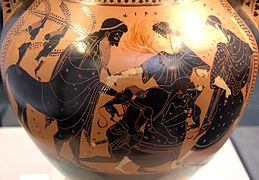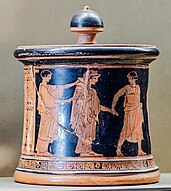I fight
In Greek mythology, Peleus (in ancient Greek, Πηλεύς / ēleús; or Πηλέας / Pēléas) is the father of Achilles, for which reason he is also called "(the) Pelida" (several times in the Iliad). He was the son of Aeacus and Endeide, kings of the Myrmidons of Aegina, and grandson of Zeus and Aegina (by the father) and Sciron and Chariclo (by the mother).
He was a hero, king of Phtia and husband of Thetis. This myth was already known to Homer's listeners.
Peleus and his brother Telamon were friends of Heracles, and served in Heracles's expedition against the Amazons, in his war against King Laomedon, and in his search for the Golden Fleece alongside Jason and the Argonauts. Although there were no other kings on Aegina, the kings of Epirus claimed descent from Peleus in the historical period.
Banishment
Peleus and his brother Telamon murdered their stepbrother Foco out of envy, since he stood out in competitions. When the crime was discovered, Aeacus banished them both from Aegina; then Telamon went to Salamis and Peleus to Phtia.
I fight in Ftía
In Phtia he was received by King Eurytion, who gave him his daughter Antigone as his wife and with her he became the father of Polidora. Later, Peleus and Eurytion participated in the hunt for the Calydonian boar, but there the former involuntarily killed the latter.
In Yolco
Once again he had to go into exile and traveled to Yolco, where Acasto reigned. There his wife, Astidamía, fell in love with him. However, Peleus rejected her. Whereupon, seized with her spite, her queen accused him before her husband of trying to seduce her.
The king, intent on revenge, invited Peleus on a hunt in his territories on the northern border of the kingdom. In the course of which, the king's men seized him, stole his sword, a valuable gift from his father, tied him up and left him to his fate, without a horse and without food, in a territory where the centaurs lived.. The first of these beings he encountered was Chiron, whom he soon befriended and helped him return to his home. This would become a lifelong friendship, and Peleus, knowing Chiron's wisdom, would later entrust him with the education of his son Achilles.
After returning safely to his home in the Aegina palace, he related all that had happened to his father. This, furious, granted him command of his army. In this way he returned to Yolcos, killed the king and queen for his infamy and definitively took possession of the country, which would become the new land of the myrmidons who accompanied him.
Voyage of the Argonauts
In his army marched not only myrmidons, but many other Greek heroes, and that is how he met Jason and the Dioscuri. Which led him to follow them as part of the crew known as the Argonauts on their daring journey to Colchis in search of the Golden Fleece.
On his return from Colchis, Peleus settled in Phtia, where, on the death of his father, he was crowned king of the Myrmidons, transferring the capital of his kingdom from Aegina to Phtia.
Wedding of Peleus and Thetis
When Peleus fell in love with Thetis, he asked Chiron for advice on finding a way to seduce her, since she, like all Nereids, had the power to change shape at will. Chiron recommended that once he caught her he would not let go, no matter what she became of her. He did so, and when she transformed into a squid, he caught her by the arm and did not let go until she returned to her female form, at which point Peleus was able to forcefully take her from her.
The wedding of Peleus and Thetis took place in the cave of Chiron, on Mount Pelion. Almost all the Greek nobility and even the gods themselves attended. During the ceremony Peleus received, as a gift from the centaur, an ash spear made by Hephaestus and Athena themselves. It was celebrated in style, Hymenaeus played the flute, Ganymede served the wine and the Nereids danced. But that happy moment was spoiled by something that would bring terrible consequences. Almost all the gods had been invited to that party, except Eris, the goddess of discord; which, furious for that affront, hatched a plan to take revenge on her. She first asked for a golden apple from the garden of the Hesperides, on which she embodied the following: kallisti ( For the most beautiful ) and threw it in the middle of the wedding. Upon seeing it, Hera, Athena and Aphrodite, each claiming to be the most beautiful, and therefore deserving of the prize, disputed it, which would result in the trial of Paris and the subsequent Trojan War.
Achilles
From the union of Thetis and Peleus, the powerful Achilles was born, who, thanks to his father asking Chiron to take care of his training and education, became a skilled lyre player and powerful warrior.
The years passed and Peleus, already old and tired, did not dare to participate personally in the Trojan war, preferring to send Achilles to the command of the Myrmidons, and once the Greeks took him out of the hiding place to which he had Sent his mother, in the palace of King Lycomedes on the island of Scyrus, they recruited him.
Last years
Peleus is not heard from again until the end of the war, from which Achilles did not return. However, his life lasted long enough to witness the glorious return of his grandson, Neoptolemus, of whom it is not known if he even knew him at the time of the meeting. The famous young man, credited with the leading role in the capture of Troy, returned to Phtia to reclaim his father's kingdom. Peleus seems to have had no objection and as soon as he reached the Greek shores, he abdicated in favor of him.
Thus, the old king lived quietly under the reign of his grandson, who married Hermione, the beautiful daughter of King Menelaus of Sparta. However, this she never bore Neoptolemus a son. But she did have him with his slave, Andromache, who gave birth to a child named Molossus. Euripides narrates that when the jealous queen Hermione asked her father for help, during the absence of Neoptolemus, they tried to kill Andromache and the little boy, it was the old Peleus who faced the powerful Spartan king and by means of words he managed to get him to leave without asking them. damage. That was when Andromache and Moloso fled from the palace to get lost heading north.
Neoptolemus, frustrated that his wife did not give him children, decided to seek advice from the oracle of Delphi, within whose enclosure he was assassinated by Orestes. Then, Peleus, already in his last days, having no descendants left, and not wanting to leave his lands to Menelaus, thought that the most sensible thing to do was to give them as an inheritance to Neoptolemus' most trusted servant. This is how, after the death of Peleus, Hélenus, former prince of Troy and later a slave of the son of Achilles, recovered his dignity by becoming king of Phtia.
| Predecessor: Eurition | Kings of Ftía (first reigned) | Successor: Neoptolemo |
| Predecessor: Neoptolemo | Kings of Ftía (second reign) | Successor: Héleno |
Gallery
Peleus and Thetis
Contenido relacionado
Priestly tradition
Sputnik 1
Heinrich Schliemann





